How to find energy advisors to build an energy-efficient home in Canada
For some, building or moving into an energy-efficient home is an attractive option – you’d be starting off with energy-efficient appliances instead of having to piece-meal upgrade old appliances and electronics in your current home. Still though, having to curate every appliance and house upgrade yourself can get overwhelming. That’s why there are service providers such as energy auditors and advisors available to make the process much easier.
In Canada, independent energy advisors can be licensed under Natural Resources Canada’s (NRCan) official marks and software. This means these auditors meet all the qualifications required by NRCan to provide you with EnerGuide labelling services. They’re not NRCan employees or agents but are recognized by the government as energy advisors.
In case you’re looking for an energy advisor and don’t know where to start, you’re in the right place. Via NRCan’s tool called “Find a service provider for new homes”, you’ll be able to find a service organization or a builder participating in energy-efficiency initiatives in your area, so you can learn your options for building or buying a new energy-efficient home.
Below is a tutorial on how to use this tool and find licensed energy advisors for building a new home.
Note: in case you need an energy advisor for home improvements to an older house, there’s a resource list at the end of this article.
Step 1. Visit the tool website here
Step 2. Select the service(s) you require

EnerGuide is the official Government of Canada mark associated with the labelling and rating of the energy consumption or energy efficiency of specific products. An EnerGuide rating demonstrates the energy performance of a home, in GJ/year.
ENERGY STAR is a program run by the U.S. Environmental Protection Agency and the U.S. Department of Energy that promotes energy efficiency. Its goal is to help consumers, businesses, and industries save money and protect the environment through the adoption of energy-efficient products and practices.
R-2000 is a voluntary housing standard – R-2000 homes are designed and built to have high R-values and greater energy efficiency throughout your home. R-values refer to an insulating material’s resistance to conductive heat flow – in other words, a high R-value refers to greater insulating effectiveness.
Step 3. Select what service provider(s) you’re looking for

Step 4. Select the region you’re in or wanting to relocate to

Step 5. Check the list of licensed energy auditors
We didn’t add a screenshot of this step as different people will see different lists based on what they’ve checked before. However, this filtered list is quite straightforward and will show the information about each service provider, including address, phone number, official website, email address, and the labels they are licensed under, such as R-2000, EnerGuide, and ENERGY STAR.
What is an energy advisor?
An energy advisor refers to a third-party consultant who is registered via a service organization licensed by Natural Resources Canada. Licensed energy advisors can provide the following services (note that they may only work on Part 9 residential buildings):
- Delivery of Natural Resource Canada’s EnerGuide Rating System, ENERGY STAR® for New Homes and R-2000 programs.
- Provide both energy modelling and airtightness testing, the two services needed to demonstrate compliance under the BC Energy Step Code for Part 9 residential buildings.
Why do I need a licensed energy advisor? What will an energy advisor do?
While you don’t technically need an energy consultant, they can make things a lot easier, whether it’s assisting builders with planning out energy efficiency measures or upgrading a current home.
The designation of energy advisor (EA) registered with Natural Resources Canada (NRCan) means that a person has met and maintained all of the required qualifications to deliver EnerGuide rating services for eligible homes in Canada.
According to NRCan, certified energy advisors demonstrate experience and knowledge in areas such as:
- EnerGuide Rating System.
- Residential construction practices for low-rise housing.
- Energy efficiency renovation practices.
- Building science.
- Basic arithmetic, geometry and computers skills.
- Data collection requirements.
- Energy simulation modeling using HOT2000, and
- Good client relations.
- Available grants for improving energy efficiency for housing.
Below are some common things an energy advisor can do for you:
- Bring third-party verification and inspection to a project via use of the Ener-Guide rating system.
- Home energy audits.
- Test homes at completion while also creating a final report and providing documentation for the EnerGuide Label.
- Provide further details of labelling programs that may best fit a project.
- Provide home evaluations based on plans prior to construction.
- Offer suggestions for improving energy usage of a home, with or without mechanical systems.
- Provide details for which materials are best to use in order to maximize air quality and energy efficiency.
- Use tools and perform testing for ensuring that a building envelope is performing at its best.
What are the energy advisor databases available in Canada?
Below is a list of the energy advisor databases available in Canada – you can use these databases to find energy advisors near you:
- Better Homes BC Search Tool: Using this tool, you can search for Part 9 residential energy home advisors or energy modellers. You can also search by location or project type: new home or renovation.
- Canadian Association of Consulting Energy Advisors (CACEA)
- NRCan’s “Find a service organization for existing homes” tool: Looking for improvements for an older home? This other NRCan tool is similar to the one detailed in the tutorial above. However, it focuses on a list of energy advisors offering EnerGuide evaluations for home improvements, instead of builders and new homes only.











